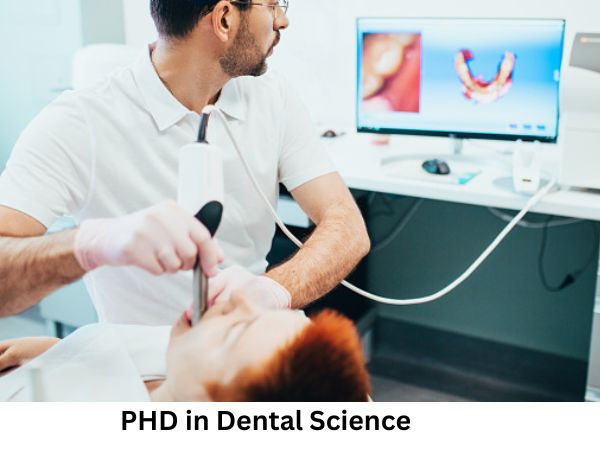Ph.D. in Dental Sciences : Introduction, Admission, Registration, Eligibility, Duration, Fees, Syllabus 2024

Introduction:
A Ph.D. in Dental Sciences is the pinnacle of academic achievement in the field, equipping individuals with advanced knowledge, research skills, and expertise necessary to address complex challenges in oral health. This rigorous program blends theoretical learning with hands-on research, preparing students to become leaders and innovators in academia, research institutions, and the healthcare industry.
Admission Process:
- Application Submission: Prospective students must submit a comprehensive application package, including academic transcripts, letters of recommendation, a statement of purpose, and sometimes, standardized test scores.
- Interview: Shortlisted candidates may be invited for an interview to assess their research interests, academic background, and suitability for the program.
- Research Proposal: Many programs require applicants to submit a detailed research proposal outlining their intended area of study and research objectives.
- Faculty Match: Identifying potential faculty mentors whose research aligns with the student's interests is crucial for a successful application.
- Admission Decision: Following review of applications and interviews, successful candidates are offered admission into the program.
Eligibility:
- Master's Degree: Most programs require applicants to hold a master's degree in a relevant field such as dentistry, oral biology, or biomedical sciences.
- Academic Excellence: A strong academic record, typically evidenced by a high GPA, is a fundamental requirement for admission.
- Research Experience: Previous research experience, demonstrated through publications or presentations, is often preferred.
- Standardized Tests: Some programs may require applicants to submit scores from standardized tests such as the GRE (Graduate Record Examination).
- Letters of Recommendation: Letters of recommendation from academic or professional references are essential to assess the applicant's suitability for doctoral studies.
- English Proficiency: For international applicants, proof of English proficiency through tests like TOEFL or IELTS is usually required.
Completion Time:
The duration of a Ph.D. in Dental Sciences varies depending on factors such as the student's research area, program structure, and individual progress. On average, students can expect to complete the program in four to six years, including coursework, research, and dissertation writing.
Career Opportunities:
- Academia: Faculty positions at dental schools or universities, where individuals can conduct research, teach, and mentor students.
- Research Scientist: Leading research projects in academic or industrial settings, focusing on areas such as oral microbiology, dental materials, or clinical trials.
- Public Health: Working in government agencies or non-profit organizations to address oral health disparities, develop health policies, and implement community-based interventions.
- Industry: Opportunities in dental product development, pharmaceuticals, biotechnology, or medical device companies, contributing to innovation and advancement in dental care.
- Consultancy: Providing expertise and guidance to dental clinics, healthcare organizations, or government bodies on research, policy, or clinical practice.
Syllabus:
- Advanced Oral Biology
- Biostatistics and Research Methodology
- Seminar Series in Dental Sciences
- Specialized Elective Courses
- Dissertation Research and Writing
- Ethics in Research and Publication
Internship Opportunities:
- Clinical Research Internships: Collaborating with dental clinics or hospitals to conduct clinical trials, patient studies, or epidemiological research.
- Industry Internships: Interning with dental product companies or research organizations to gain insights into product development, testing, and regulatory affairs.
- Global Health Initiatives: Participating in international health projects or outreach programs aimed at addressing oral health disparities and promoting community engagement.
- Teaching Assistantships: Assisting faculty members in teaching undergraduate or graduate courses, gaining valuable pedagogical skills and experience.
Scholarships and Grants:
- Institutional Fellowships: Universities may offer merit-based fellowships or scholarships to exceptional Ph.D. candidates.
- Research Grants: Securing funding from government agencies, private foundations, or industry sponsors to support research projects and dissertation work.
- Teaching Assistantships: Opportunities to work as teaching assistants, providing a stipend and tuition remission in exchange for teaching responsibilities.
- External Fellowships: Prestigious fellowships such as the National Institutes of Health (NIH) grants or the Fulbright Scholarship provide generous funding for doctoral research.
- Travel Grants: Funding for conference travel and research presentations, enabling students to disseminate their findings and network with peers and experts.
FAQs:
Can I pursue a Ph.D. in Dental Sciences without a background in dentistry?
While a background in dentistry or related fields is preferred, some programs may accept students from diverse academic backgrounds such as biology, biochemistry, or public health.
What is the difference between a Ph.D. and a D.D.S. (Doctor of Dental Surgery) degree?
A Ph.D. in Dental Sciences is a research-focused doctoral degree, whereas a D.D.S. is a professional degree that prepares individuals for clinical practice as dentists.
Do I need to have a specific research topic in mind before applying for a Ph.D. program?
While it's beneficial to have a general research interest, many programs allow students to explore different research areas before choosing a specific topic for their dissertation.
Are there opportunities for international students to pursue a Ph.D. in Dental Sciences in the United States?
Yes, many universities in the United States welcome applications from international students and may offer financial assistance and support services tailored to their needs.
What are the prospects for employment after completing a Ph.D. in Dental Sciences?
Graduates of Ph.D. programs in Dental Sciences are in high demand for roles in academia, research institutions, industry, and public health, with opportunities for career advancement and leadership positions.
